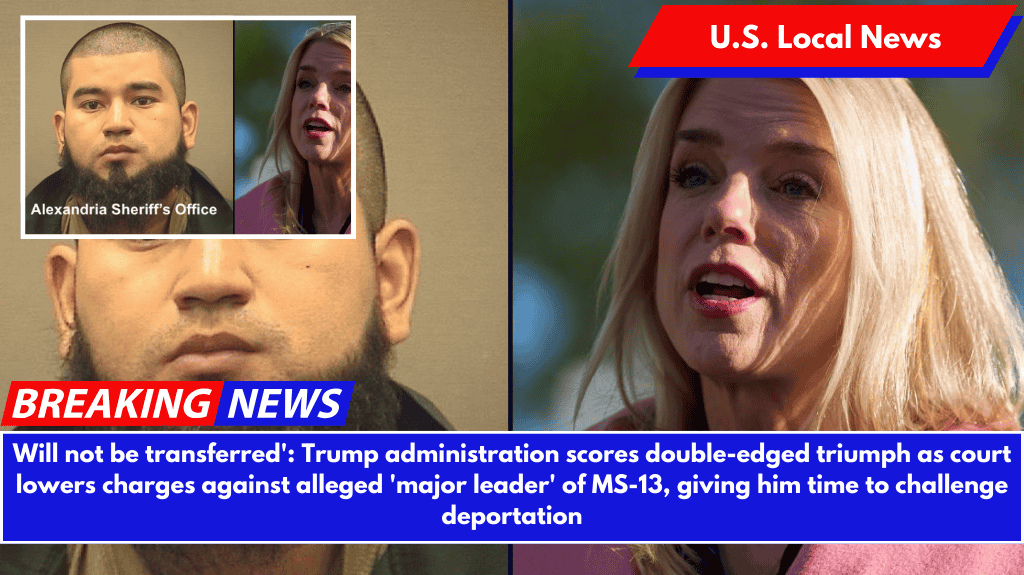On Tuesday, the Trump administration won the dismissal of criminal charges against a man previously accused of being a top MS-13 leader—with a catch. The judge in the case stayed his own order until Friday morning, preventing federal authorities from transferring him to the “jurisdiction” of the Department of Homeland Security until then.
That roughly three-day pause will allow counsel for Henrry Villatoro Santos, 24, to either appeal the ruling or initiate a separate legal proceeding aimed at blocking, or stalling, the government’s all-but-telegraphed plans for his quick “removal and deportation.”
On March 27, Villatoro Santos was charged with one count of possessing a firearm by an undocumented alien.
While the charging document and affidavit filed in his case were threadbare and conclusory, respectively, as to his alleged connections to MS-13, a press conference helmed by U.S. Attorney General Pam Bondi on the day of his arrest — and attended by FBI Director Kash Patel, Virginia Gov. Glenn Youngkin, and the U.S. Attorney for the Eastern District of Virginia Erik Siebert — repeatedly contained accusations that Villatoro Santos was among the highest ranks of the infamo
In public comments, Trump administration officials, including President Donald Trump, repeatedly emphasized the defendant’s alleged MS-13 status, with the president referring to him as a “major leader” of the transnational gang.
In court filings, the government offered only one sentence making such claims.
“FBI agents and TFOs also observed indicia of MS-13 association in the garage bedroom,” federal authorities claimed in their affidavit.
Earlier this month, the government moved to dismiss the gun charges, a day after the federal public defender’s office withdrew from the case and Villatoro Santos hired private counsel.
On April 10, defense attorney Muhammad Elsayed criticized the development in a motion to delay entry of dismissal, arguing that the DOJ was dropping the firearm possession case in favor of summary removal under immigration law, which provides fewer constitutional rights to defendants.
Since then, both parties have acknowledged the “unusual” nature of the case.
“The undersigned is keenly aware of the unusual nature of this motion,” the defense motion reads. “But these are unusual times.”
The government’s response in opposition dismisses the defense motion for allegedly lacking legal arguments.
“Villatoro marshals no meaningful authority in support of his concededly ‘unusual’ request,” the motion from the Department of Justice states. “That is unsurprising, for no legal basis backs his bid for delay.”
On Monday, motion practice continued.
In a defense response, Villatoro Santos’ attorney reiterated arguments that his client was likely to suffer the same fate as Kilmar Armando Abrego Garcia, a 29-year-old father with protected status who was illegally shipped off to El Salvador’s notorious Centro de Confinamiento de Terrorismo (CECOT) despite two court orders.
“Here, the Government has made clear through public pronouncements its intent to hand over Mr. Villatoro Santos to the Salvadoran authorities so that he can be imprisoned there through a process in which there are no due process requirements to observe, no constitutional rights to protect, and no judicial oversight,” according to the motion. “This is precisely the type of evil against which the ‘leave of court’ clause in Rule 48(a) seeks to protect.”
In this case, the government used a “Rule 48 Motion” to compel dismissal. This federal Rule of Criminal Procedure, which governs case dismissals, gives a court limited discretion in granting a dismissal initiated by the government.
There is, however, some discretion; the government must obtain “leave of court,” which, according to long-standing precedent, grants the judge “a discretion broad enough to protect the public interest in the fair administration of criminal justice.”
In the Villatoro Santos case, the defense argued that the government was being vague about its deportation plans.
From the most recent defense filing, at length:
One [sic] the one hand, if the Government intends to follow the law in its pursuit of Mr. Villatoro Santos’s removal — that is to serve him with a Notice to Appear (which it has not done to date), provide him with a Section 240 hearing, ensure his right to counsel is not infringed, and allow him the ability to contest his removability in immigration proceedings — then the Government’s motion to dismiss is not made in bad faith and is not clearly contrary to manifest public interest. On the other hand, if, as its public statements and its conduct to date strongly suggest, the Government intends to summarily deport Mr. Villatoro Santos by whisking him onto a plane to El Salvador without notice and a right to be heard in immigration proceedings, then the dismissal of the instant case at this time would clearly be done in bad faith and would be manifestly contrary to public interest. It does not serve the public interest, nor is it an act of good faith, for the Government to rush to deprive this Court of jurisdiction over Mr. Villatoro Santos if its aim is to thereafter deprive him of his well-established constitutional right to due process of law.
The defense stated unequivocally that the Trump administration “has disregarded” Fifth Amendment Due Process protections for a large number of immigrants “in the context of removal proceedings.”
“The Government has disregarded this well-established principle and defied court orders in the process in other cases, effectively carrying out forcible disappearances to the black hole that is CECOT,” according to the complaint.
“Its public statements in this case strongly suggest that it intends to do so again with Mr. Villatoro Santos.” And the government’s response memorandum does nothing to alleviate the very real concern that it intends to disregard the law once more in pursuit of favorable headlines.
If the undersigned is simply wrong about everything, the Government should have no qualms about providing this Court with the necessary information about the steps it intends to take in pursuit of removal after this case is dismissed.”
The government, for its part, appears to have conceded that their plans for Villatoro Santos include deportation.
“It is well within the prerogative of the United States to seek the removal of aliens who are illegally or unlawfully in this country in lieu of prosecuting them, regardless of whether charges have been filed,” states one footnote in the government’s motion filed last week.
Another footnote reinforced the point:
While defendants are not entitled to tread water on the criminal docket while they explore potential avenues to thwart removal proceedings in immigration court, it is worth noting that Villatoro has already obtained nearly half the 14-day pause he seeks insofar as the motion to dismiss will remain unresolved pending the hearing scheduled for April 15.
During that hearing, the government clearly convinced the judge to grant the “leave of court” required for a voluntary dismissal, according to a minute entry on Villatoro Santos’ docket.
However, the defense was also given a salve, and now has 72 hours to begin the process of convincing another judge — or judges — that summary removal to El Salvador is improper.
“Gov’t Motion to Dismiss – Argued & GRANTED,” the terse order reads. “Ordered that the entry of the Order is STAYED until 4/18/2025 @ 10:00am. Deft will not be transferred to the jurisdiction of DHS before 4/18/2025 @ 10:00am. Order to follow.”











